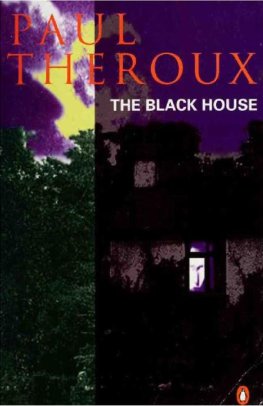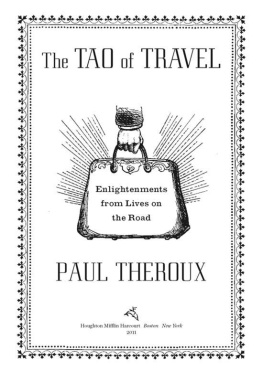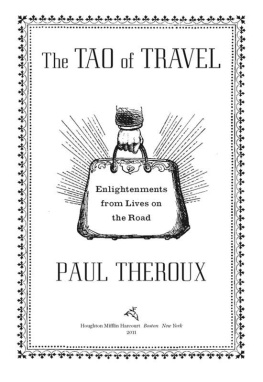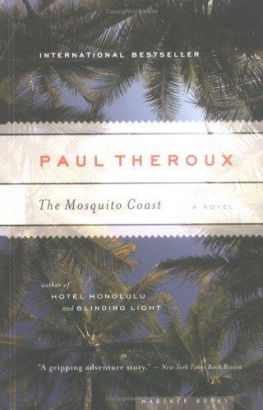Paul Theroux - Sir Vidias Shadow: A Friendship Across Five Continents
Here you can read online Paul Theroux - Sir Vidias Shadow: A Friendship Across Five Continents full text of the book (entire story) in english for free. Download pdf and epub, get meaning, cover and reviews about this ebook. City: Boston, year: 2000, publisher: Houghton Mifflin Harcourt, genre: Detective and thriller. Description of the work, (preface) as well as reviews are available. Best literature library LitArk.com created for fans of good reading and offers a wide selection of genres:
Romance novel
Science fiction
Adventure
Detective
Science
History
Home and family
Prose
Art
Politics
Computer
Non-fiction
Religion
Business
Children
Humor
Choose a favorite category and find really read worthwhile books. Enjoy immersion in the world of imagination, feel the emotions of the characters or learn something new for yourself, make an fascinating discovery.
- Book:Sir Vidias Shadow: A Friendship Across Five Continents
- Author:
- Publisher:Houghton Mifflin Harcourt
- Genre:
- Year:2000
- City:Boston
- Rating:4 / 5
- Favourites:Add to favourites
- Your mark:
- 80
- 1
- 2
- 3
- 4
- 5
Sir Vidias Shadow: A Friendship Across Five Continents: summary, description and annotation
We offer to read an annotation, description, summary or preface (depends on what the author of the book "Sir Vidias Shadow: A Friendship Across Five Continents" wrote himself). If you haven't found the necessary information about the book — write in the comments, we will try to find it.
Sir Vidias Shadow: A Friendship Across Five Continents — read online for free the complete book (whole text) full work
Below is the text of the book, divided by pages. System saving the place of the last page read, allows you to conveniently read the book "Sir Vidias Shadow: A Friendship Across Five Continents" online for free, without having to search again every time where you left off. Put a bookmark, and you can go to the page where you finished reading at any time.
Font size:
Interval:
Bookmark:

First Mariner Books Edition 2000
Afterword 1999 by Paul Theroux
Copyright 1998 by Paul Theroux
All rights reserved
For information about permission to reproduce selections from this book, write to Permissions, Houghton Mifflin Harcourt Publishing Company, 215 Park Avenue South, New York, New York 10003
www.hmhco.com
The Library of Congress has cataloged the print edition as follows:
ISBN 978-0-618-00199-6 (pbk)
Portions of this book have appeared in The New Yorker.
The Afterword originally appeared, in different form, in The New York Times Book Review and the Observer in 1998.
Lines by Derek Walcott are from Collected Poems 19481984 by Derek Walcott. Reprinted by permission of Farrar, Straus & Giroux, Inc. Lines from The Whitsun Weddings are from Collected Poems by Philip Larkin. Copyright 1988, 1989 by the Estate of Philip Larkin. Reprinted by permission of Faber and Faber Ltd. The
quotation from Poetry of Departures by Philip Larkin is reprinted from The Less Deceived by permission of Faber and Faber Ltd.
eISBN 978-0-547-52619-5
v1.0214
You must give me the pleasure of seeing what I look like. It would be like hearing ones voice, seeing oneself walk down the street. You must feel free. I know, for instance, that I was once young; and that I have changed; lost and gained and sometimes strayed, as I have grown older. Show me!
V.S. Naipaul, in a letter to Paul Theroux,
April 17, 1970
That one person should wish to arouse in another memories relating to a third person is an obvious paradox. To pursue this paradox freely is the harmless intention of all biography. The fact of my having known Carriego does not, I contendnot in this particular casemodify the difficulty of the undertaking.
Jorge Luis Borges, Evaristo Carriego
PART ONE
I T IS A GOOD THING that time is a light, because so much of life is mumbling shadows and the future is just silence and darkness. But time passes, times torch illuminates, it finds connections, it makes sense of confusion, it reveals the truth. And you hardly know the oddness of life until you have lived a little. Then you get it. You are older, looking back. For a period you understand and can say, I see it all clearly. I remember everything.
It can be a brief passage, for a revelation. Only a few days after Julian first met him, he realized that what he had taken to be a smile on the face of U. V. Pradesh was really a look of exquisite, almost martyrlike suffering. The mans whole name, Urvash Vishnu Pradesh, was the slushiest Julian had ever heard, a saliva-making name like a cough drop that forced you to suck your cheeks and rinse your tongue with sudsy syllables.
The fact that many people in Kampala had never heard of U. V. Pradesh made him more important in Julians eyes. He was said to be brilliant and difficult. He was smaller, more frenetic than any local Indianthe local Indians could be satirical, but they were sly. U. V. Pradeshs face, tight with disapproval, gleamed in the Uganda heat. His hair was slick from his wearing a hat. Ugandan Indians didnt wear hats, probably because Ugandan Africans sometimes did.
U. V. Pradesh seldom smiledhe suffered a great deal, or at least he said he did. Life was torture, writing was hell, and he said he hated Africa. He was afraid. Much later he explained to Julian that he felt intimidated by bush people. He had a fear of being swallowed by the bush, a fear of people of the bush. New to Uganda, U. V. Pradesh looked at the place with his mouth turned down in disgust. From some things he said about African passions and his own restraint, Julian had a sense in him of smothered fires.
Actually, U. V. Pradesh had reason to be afraid. The Kabaka of Buganda, Sir Edward Frederick Mutesa, whom Ugandans called King Freddy, was being threatened with overthrow and death by soldiers from the northern tribes. The mess came later, and was in turn buried by greater calamities that were much sadder and more violent even than U. V. Pradesh had predicted.
Listen to me, Julian.
Julian did nothing but listen, and he wanted U. V. Pradesh to call him Jules, as his family and friends did.
Julian, this will go back to bush, U. V. Pradesh said, sometimes in a scolding way, sometimes as a curse. And that suffering grimace again. He walked in the slanting sun of Kampala, his shadow like a snare. All of it, back to bush.
Sure of something, or pleased by the sound, he repeated the phrase, a verbal tic called bis. He was always sure, so his repetitions were frequent, a little chant and echo in his speech, still with the faintest singsong of the West IndiesU. V. Pradeshs birthplace, the setting of many of his novelslingering in the intonation.
Julian started out knowing nothing, not any of this, not even what the initials U. V. stood for, and it was only long after that he understood. He was too young to look back, and knew only the terror of always having to look ahead at the looming darkness, and instead of reassurance seeing uncertainty and awful choices, or no choices, and risk, and doubt, feeling afraid.
When Julian was young and he squinted at the big unreadable map of his life, even the magnificent light of Africa was no help. Yet he was hopeful. He felt he had what he wanted, and especially he had baraka, as they said in Swahiligood fortune, blessings. He was a teacher, but he spent most of his time writing. It did not matter to him that he was unknown in America. He was famous in Kampala.
Be grateful for what you have, Jules, his father had told him before he left home. No one owes you a thing.
It was wise advice for someone going to an African country. Julian felt lucky every time something good came his way, and luckiest of all his first full year in Ugandahis third in Africa. He had a good job, a reliable car, and a well-shaded house. Uganda was the greenest place he had ever seen. He was in love with an African girl. She was nineteen and he was twenty-four. He was at work on a novel. His life had at last begun.
The African girl, Yomo Adebajo, was Julians own height, nearly six feet, and slender, from a tall, stately tribe in Nigerias Western Region. Julian had been traveling there the year before. He invited her to East Africa and, just like that, she crossed Africa to join him. In Uganda, which was a hothouse of steamy gossip and expatriate scandals, their liaison was singled outtheir not being married, their living together, their aloofness from others in Kampala, and the way she dressed. West Africans, rare in Uganda, were much more exotic than whites or Indians. Ugandan women wore skirts and dressesfrocks was their wordand Mother Hubbards, all drapes and frilly leg-of-mutton sleeves, oldfangled words for outdated fashions, designed by turn-of-the-century missionaries for the sake of modesty. Yomo stood out like a princess in a fable in her yellow and purple robes, her stiff brocade turban, and her sash that was woven with gilt thread.
This young woman had the dark, drugged eyes and sculpted face you see in certain bewitching bronzes from her region of Nigeria. In poor provincial Uganda she was taken to be an Ethiopian or an EgyptianNilotic, people said, believing her to be a visitor from the upper Nile, someone who, from her looks, might have arrived sitting upright, cross-legged, on a flying carpet.
Ugandans goggled at Yomothey were smaller and had to look upas though she were from some nation of the master race of blacks that lived beyond the Mountains of the Moon.
Next pageFont size:
Interval:
Bookmark:
Similar books «Sir Vidias Shadow: A Friendship Across Five Continents»
Look at similar books to Sir Vidias Shadow: A Friendship Across Five Continents. We have selected literature similar in name and meaning in the hope of providing readers with more options to find new, interesting, not yet read works.
Discussion, reviews of the book Sir Vidias Shadow: A Friendship Across Five Continents and just readers' own opinions. Leave your comments, write what you think about the work, its meaning or the main characters. Specify what exactly you liked and what you didn't like, and why you think so.
















